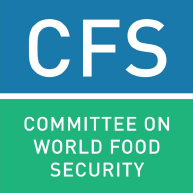CFS 50 - Special Event: Food Systems Transformations, Building long-term resilience to global crises
CFS 50 - Special Event: Food Systems Transformations, Building long-term resilience to global crises
October 7, 2022 - Last update: October 7, 2022Thursday 13 October 2022 - 10:00-13:00
BACKGROUND:
Unprecedented challenges are being faced globally in the wake of the ongoing cost of living-, climate- and COVID 19 crises, compounded by conflicts in Ukraine and elsewhere. The world's food system is failing to fulfil the right to adequate food for all and efforts to achieve SDG2 are trailing behind globally. As a result, the number of vulnerable populations living in poverty and confronted with the additional and unacceptable threats of hunger and malnutrition is rising. Coordinated policy responses are needed now to reverse these negative trends.
Less than eight years remain to fulfil the ambition of the Sustainable Development Goals (SDGs). Hunger and malnutrition have increased, poverty reduction has plateaued, inequality has risen – all these are trends linked to serious challenges to agrifood systems. The COVID-19 pandemic accelerated these trends, which are further stimulated by the multidimensional, multilevel current global cost-of -living crisis. Food systems pose the greatest of challenges, and unsustainable development of food systems is a key factor in large-scale biodiversity loss, the degradation and depletion of soil, land and water resources, and increased global greenhouse gas emissions. Inclusive and sustainable food systems on the other hand, are a core enabler of achieving most of the SDGs, and food system transformation offers the greatest opportunities to arrive at the global commitments as laid out in the 2030 Agenda for Sustainable Development.
In this regard, recovery from the severe and lasting impacts of COVID 19 on food security and nutrition, and increasingly complex, multidimensional, multilayer crises, call for stronger more resilient food systems to support the global commitments 2 towards advancing the 2030 Agenda. To this end, it is fundamental to accelerate progress towards inclusive and sustainable food systems and to integrate the economic, social- and environmental dimensions of sustainability throughout agriculture and food systems.
Catalysts to resilient food systems are context-appropriate transition pathways, towards sustainable agriculture and food systems that,- aligned with SDG’s-: i) are inclusive and equitable, enhancing the livelihoods of farmers and food system workers, and respect human rights; ii) provide healthy diets accessible and nutrition for all; iii) are resilient, diversified, support climate change adaptation and mitigation, conserve biodiversity, ensuring the sustainable management and use of ecosystems, natural resources, water and biodiversity, and minimizing food loss and waste, including through agroecological and other innovative approaches.
In 2021, the CFS called for a “systemic and holistic approach to food systems transformation and encourages that it be done in a coherent manner, as appropriate and in accordance with, and dependent on, national context and capacities” 23 . In parallel, in 2021 the UN Food Systems Summit offered a platform to examine different options and consolidate country-level commitments and actions into national pathways for sustainable food systems in line with the 2030 Agenda for Sustainable Development.
To this end, recalling GA resolution A/RES/76.2644, and, building on the 15 July CFS/UNFSS Hub HLPF Side Event 2022: Food System Transformations as 2030 Agenda Accelerators, this Special Event will provide space for countries and other key stakeholders to share their relevant experiences, lessons learned and related evidence link to food systems and pathways/transformation.
OBJECTIVES
1) Highlight evolving global efforts towards food system transformation in advancing the 2030 Agenda at country level against the current global food security landscape.
2) Showcase and share Member States’ Pathways to food system transformations and key issues or approaches impacted by the global food security crisis, highlighting contributions and support from CFS and UNFSS Hub, Coalitions, and others, as relevant.
3) Underline the critical importance of urgent action via policy coordination and collaboration by key actors, and inclusive governance and accountability.
MODERATOR
Gerda Verburg, Coordinator, Scaling up Nutrition
KEYNOTE SPEAKERS
- H.E. Gabriel Ferrero y de Loma-Osorio, CFS Chairperson, Ambassador at Large Global Food Security, Ministry of Foreign Affairs, European Union and Cooperation, Spain
- Stefanos Fotiou, Director, Office of Sustainable Development Goals at FAO and Director of the UN Food Systems Coordination Hub
FORMAT
The session will comprise of: 1) an opening segment with keynote addresses from the CFS Chair and Director of the UNFSS HUB setting the scene of the session; 2)presentation of country experiences of their national pathway process and results in the face of the current global food crisis and sharing global efforts through coalitions; 3) a dynamic and interactive dialogue to follow country presentations with contributions from Member, Coalition leads, and other CFS stakeholders.
